http://www.usna.edu/Users/humss/bwheele ... athur.html
http://www.sacred-archery.com/Prophet.htm
http://forum.mpacuk.org/archive/index.php?t-4157.html
http://ibnulazim.wordpress.com/2008/09/ ... ammad-saw/
Disclaimer:
This information is not my own, but sourced from the above mentioned website based on their own research.
the Swords of Prophet Muhammed (peace be upon him)
Al-Ma'thur .....
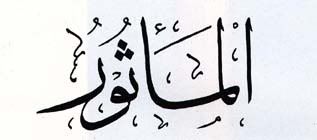
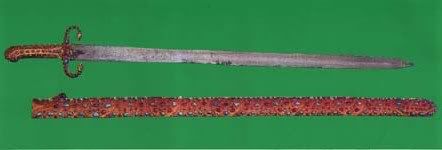
Al-Ma'thur, also known as "Ma'thur al-Fijar" is the sword which is said to have been owned by the Prophet Muhammad before he received his first revelations in Mecca. It was willed to him by his father. The prophet Muhammad migrated with the sword from Mecca to Medina, and the sword remained with him until it was transferred, along with other war equipment, to Ali ibn Abi Talib.
The blade is 99 cm in length. The handle is of gold in the shape of two serpents, and is encrusted with emeralds and turquoise. Near the handle is a Kufic inscription saying: 'Abdallah ibn 'Abd al-Muttalib. Today the sword is housed in the Topkapi Museum, Istanbul.
Photograph taken from Muhammad Hasan Muhammad al-Tihami, Suyuf al-Rasul wa 'uddah harbi-hi (Cairo: Hijr, 1312/1992).
Al-Battar .....
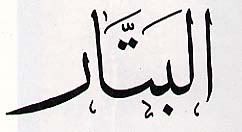

The al-Battar sword was taken by the prophet Muhammad as booty from the Banu Qaynaqa. It is called the "sword of the prophets" and is inscribed in Arabic with the names of David (Dawood), Solomon (Sulaiman), Moses (Moosa), Aaron (Haroon), Joshua (Yashua), Zechariah (Zakariyyah), John(Yahya), Jesus (Esa), and Muhammad, peace be upon them all. It also has a drawing of King David (Dawood) when cut off the head of Goliath to whom this sword had belonged originally. The sword also features an inscription which has been identified as Nabataean writing.
The blade of the sword is 101 cm in length. It is preserved in the Topkapi Museum, Istanbul. Some report that it is this sword that Jesus will use when he returns to Earth to defeat the anti-Christ Dajjal.
Photograph taken from Muhammad Hasan Muhammad al-Tihami, Suyuf al-Rasul wa 'uddah harbi-hi (Cairo: Hijr, 1312/1992).
Dhu al-Faqar .....
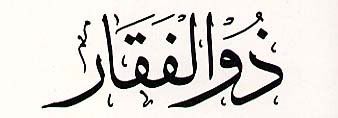

Dhu al-Faqar is the name of this sword, taken as booty by the prophet Muhammad at the Battle of Badr. It is reported that the prophet Muhammad gave the sword to Ali ibn Abi Talib, and that Ali returned from the Battle of Uhud covered with blood from his hands to his shoulders, having Dhu al-Faqar with him. Many sources report that this sword remained with Ali ibn Abi Talib and his family, and that the sword had two points, perhaps represented here by the two lines engraved on the blade.
Photograph taken from Muhammad Hasan Muhammad al-Tihami, Suyuf al-Rasul wa 'uddah harbi-hi (Cairo: Hijr, 1312/1992).
Hatf .....
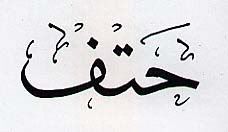
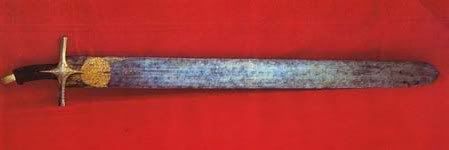
Hatf is a sword which the prophet Muhammad took as booty from the Banu Qaynaqa. It is said that King David (Dawood) took his sword "al-Battar" from Goliath as booty when he defeated him, but he was less than 20 years old. God gave King David (Dawood) the ability to work with iron, to make armour and weapons and instruments of war [it is said that Dawood had invented the chain-mail armour], and he made for himself a sword. It was thus that the Hatf sword came about, resembling the al-Battar but larger than it. He used this sword and it was passed onto the tribe of Levites who kept the weapons of the Israelites until it passed into the hands of the prophet Muhammad.
Today this sword is housed in the Topkapi museum. The blade is 112 cm in length and has a width of 8 cm.
Photograph taken from Muhammad Hasan Muhammad al-Tihami, Suyuf al-Rasul wa 'uddah harbi-hi (Cairo: Hijr, 1312/1992).
Al-Mikhdham .....
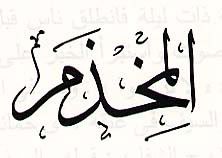

The sword called Al-Mikhdham is reported to have passed from the prophet Muhammad to Ali ibn Abi Talib, and from him to his sons. Some report that the sword was taken as booty by Ali ibn Abi Talib from a raid he led in Syria.
The sword is now in the Topkpoki Museum, Istanbul. The blade is 97 cm in length and is inscribed with the name of Zayn al-Din al-Abidin.
Photograph taken from Muhammad Hasan Muhammad al-Tihami, Suyuf al-Rasul wa 'uddah harbi-hi (Cairo: Hijr, 1312/1992).
Al-Rasub .....
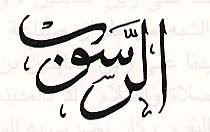

The al-Rasub sword is one of the nine swords of the prophet Muhammad. It is said that the weapons of the house of the prophet Muhammad were kept among his family just like the Ark was kept with the Israelites.
The sword is preserved in the Topkapi museum, Istanbul. Its blade is 140 cm in length. It has gold circles on which are inscribed the name of Ja'far al-Sadiq.
Photograph taken from Muhammad Hasan Muhammad al-Tihami, Suyuf al-Rasul wa 'uddah harbi-hi (Cairo: Hijr, 1312/1992).
Al-’Adb .....
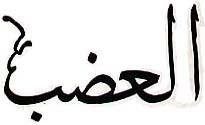

Al-'Adb, the name of this sword, means "cutting" or "sharp." This sword was sent to the prophet Muhammad by one of his companions just before the Battle of Badr. He used this sword at the Battle of Uhud and his followers used it to demonstrate their fealty to him.
The sword today is in the Husain mosque in Cairo, Egypt.
Photograph taken from Muhammad Hasan Muhammad al-Tihami, Suyuf al-Rasul wa 'uddah harbi-hi (Cairo: Hijr, 1312/1992).
Al-Qadib .....
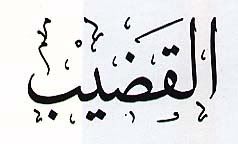

Al-Qadib is a thin-bladed sword which, it was said, resembled a rod. It was a sword of defence or companionship for the traveller but not used to battle. Written on the side of the sword in silver is the inscription: "There is no god but God, Muhammad the apostle of God--Muhammad b. Abdallah ibn Abd al-Muttalib." There is no indication in any historical source that this sword was used or in any battle. It stayed in the house of the prophet Muhammad and was only used later by the Fatimid caliphs.
The sword is 100 cm in length and has a scabbard of dyed animal hide. Today the sword is housed in the Topkapi Museum, Istanbul.
Photograph taken from Muhammad Hasan Muhammad al-Tihami, Suyuf al-Rasul wa 'uddah harbi-hi (Cairo: Hijr, 1312/1992).
Qal’i .....
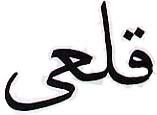
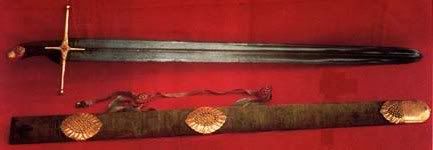
This sword is known as "Qal'i" or "Qul'ay." The name may be related to a place in Syria or a place in India near China. Other scholars state that the adjective "qal'i" refers to "tin" or "white lead" which was mined in different locations. This sword is one of the three swords which the prophet Muhammad acquired as booty from the Banu Qaynaqa. It is also reported that the grandfather of the prophet Muhammad discovered "swords of Qal'i" when he uncovered the Well of Zamzam in Mecca.
Today the sword is preserved in the Topkapi Museum, Istanbul. Its blade is 100 cm in length. Inscribed in Arabic on its blade above the handle is: "This is the noble sword of the house of Muhammad the prophet, the apostle of God." The blade of this sword is distinguished from the other swords because of its wave-like design.
Photograph taken from Muhammad Hasan Muhammad al-Tihami, Suyuf al-Rasul wa 'uddah harbi-hi (Cairo: Hijr, 1312/1992).
___________________________________________________________________________________
the Bows of Prophet Muhammed (peace be upon him)
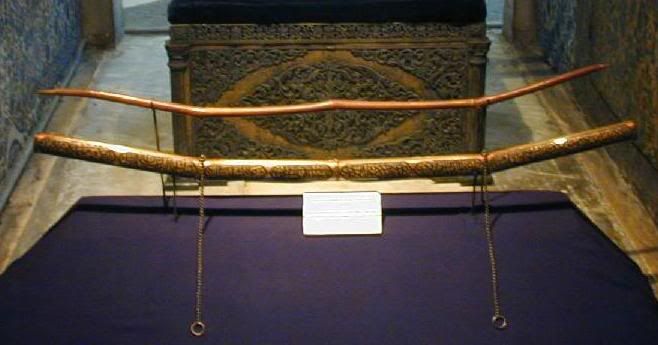

The only surviving bow of the Prophet Muhammad, is kept in the Topkapi Museum in Istanbul, along with many other holy relics. It is made from bamboo, and dates from around 615 A.D. It is said to have passed into the Caliphal treasury by the hand of Qatadah ibn al-Nu’man. The case was commissioned by the Ottoman Sultan Shah Ahmed I, (ruled 1603-1617) and is inscribed with poetic couplets in praise of the bow, in Ottoman Turkish.
According to the explanations of the biographers (from The Book Sacred Archery: The Forty Prophetic Traditions), it appears that in the books reference is made to the bows belonging to Prophet Muhammed - the Lodestar of Mankind, the Messenger of the Common and the Elect, peace and blessings of God Almighty be upon him, as being six in number:
- One of them was called Rawja’;
- One was called Safra’ – ‘the Yellow’ – this one was supposedly taken from the tribe of the Bani Qaynuqa’;
- One was called Bayza’ – ‘the White’, and it was made of the wood of the fir tree. This one is also said to have been taken from the tribe of the Bani Qaynuqa’.
- Another bow was called Sadad – ‘the Straight’, for the reason that when shot, it never failed to hit the mark; therefore it was thus named.
- Another one of the bows was called Zawra’ – ‘the Crooked’; and because its voice was concealed, it was also named Katum.
...and God knows best.








